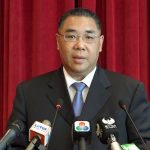 The Chief Executive, Mr Chui Sai On, meets the press.
The Chief Executive, Mr Chui Sai On, meets the press.
The Chief Executive, Mr Chui Sai On, today said he had confidence the Government would be able to cover the city’s ‘land debt’ – i.e., the amount of land the Government owed to those developers that had given up land concession plots in order to help public-sector building projects. That ‘land debt’ would be met provided that all the city’s expired and undeveloped land concessions reverted to the Government, as was required. Such plots could then form part of the Government’s reserves of land, said Mr Chui. The Government’s policy on land resources had not changed. Any plots of land that reverted to the Government would be considered – on a priority basis – for the following uses: public housing units; facilities for the general public; and offices for Government departments, he added. Mr Chui said the Government had a total outstanding ‘land debt’ of 88,806 square metres. This 'land debt' would be paid off - by compensating in kind with new land -those developers previously required to relocate projects in order to enable development of Government initiatives. The Government had already taken steps, in line with the Land Law and the Basic Law, to ensure that ‘idle plots’ – i.e. cases where leaseholders failed to develop a land concession according to the timetable and terms attached to the concession – would revert to the authorities. The Government would announce – in a timely manner – more information about the topics of ‘idle lands’ and the ‘land debt’. It would take time to analyse all the cases involved, he said. The Chief Executive made the remarks this morning at Macau International Airport, before leaving Macao for a three-day visit to Beijing. While there, Mr Chui is scheduled to meet officials from several ministries and departments, in order to discuss Macao’s first Five-Year Development Plan. The latter focuses on the city’s socio-economic development spanning the period from 2016 to 2020. The Beijing meetings are designed to gather further opinion regarding how to incorporate Macao’s development into the country’s 13th Five-Year Plan and the nation’s Silk Road Economic Belt and 21st-Century Maritime Silk Road (collectively known as the “Belt and Road” initiative). The talks will also consider how to coordinate and communicate such matters, with reference to the Central Government’s own administrative role. The Chief Executive and officials in Beijing would also discuss how further to intensify Guangdong-Macao cooperation, in accordance with the principles and vision stated in the Framework Agreement on Cooperation Between Guangdong and Macao. How Macao could enhance transportation links with neighbouring cities, and how the places could improve services at boundary checkpoints, would also be included in the discussions. The Chief Executive gave comment on other matters. When asked by reporters, Mr Chui stated the Government adhered to two principles in relation to the city’s planned centre for infectious disease control. First, in order to prevent and control outbreaks of disease – as per the guidelines of the World Health Organization – any region or city capable of building further facilities for that purpose should do so. Second, protecting public health was always the most important issue, namely if ever there were outbreaks of disease in a community or a threat of such outbreaks. The construction of further facilities to control infectious disease was aimed not only at providing better health services, but also was aimed at securing further the health of Macao’s population and the health of the city’s medical personnel. Mr Chui also commented on the newly-constructed Pac On Ferry Terminal, located in Taipa. He said trial operations had begun recently at the new facilities, and followed several adjustments to the plans for the terminal. The Government aimed to utilise the passenger capacity of the ferry terminal – along with that of Macau International Airport – in order assist the transformation of Macao into a world centre of tourism and leisure, he stated.


